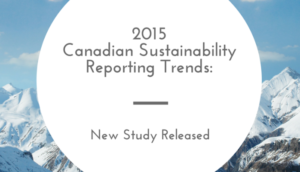
The Centre for Sustainability & Excellence recently concluded a comprehensive study that reviewed 415 sustainability-corporate responsibility reports publicly reported in 2015 by companies in North America. This project specifically examined reporting standards/guidelines and external assurance practices most commonly used to better understand the current state of Sustainability Reporting.
Within this report, 104 Canadian Sustainability Reports were reviewed revealing that 60% were published from large companies while 40% came from small and medium sized enterprises (SMEs) broken out as 36% and 4% respectively. The reporting of SMEs is interesting, particularly when pitched against industry type. In Canada, mining, financial services and energy/utilities remain the top three sectors publishing reports which wasn’t surprising. However, small-medium enterprises (SMEs) that comprise most of the everyday ‘lifestyle’ consumables such as construction, textiles/apparel, retailers, tourism, food and beverage fell significantly short, holding future potential to influence consumer shift, change and sustainable leadership.
According to Industry Canada’s most recent data on Canadian company demographics, large companies (+500 employees) comprise only 0.14% of the total number of businesses in Canada. Small businesses (1-99 employees) comprise 98% of the total number of businesses, raising eyebrows to the opportunity and potential impact of future sustainable practices. It is estimated that the reporting practices of SMEs will increase significantly over the next few years, which could create interesting opportunities for community-level awareness, innovation and mobilization for change.
Companies with tangible and publicly disclosed sustainability goals are four to five times more likely to improve their financial, social and environmental performance compared to those who do not set goals.
Companies with tangible and publicly disclosed sustainability goals are four to five times more likely to improve their financial, social and environmental performance compared to those who do not set goals. While collective results from the CSE study showed that the majority of companies (69%) use the (GRI) guidelines, only 31% of them were externally assured which falls significantly below the global trend of 54%. Barriers to external assurance included a lack of understanding related to the importance and benefits, as well as the issue of cost.
Results from this study points to some clear trends we can begin to watch when it comes to sustainability reporting and the opportunities for greater transparency which include:
- A clearly visible trend of public (listed companies) to publish sustainability reports in order to disclose information and be transparent about their sustainability performance. The vast majority (82%) of the companies that published a sustainability report in 2015 are public (listed) companies. Overall more than 1,000 Reports are expected to be published in North America in the next two years.
- A growing trend for Small-Medium Enterprises to publish sustainability reports in order to increase their transparency, attract customers and grow their business. The number of SME’s which publish sustainability reports is expected to grow in the following years.
- The reporting guidelines of the Global Reporting Initiative (GRI) remain the most widely used reporting guidelines for conducting sustainability reports. Surprisingly, there are still large brands which do not use GRI or other guidelines.
- The percentage of companies and organizations in North America that seek external assurance remains well below the global average, raising questions about the level of transparency and credibility of the data disclosed.
As Sustainability Reporting continues to increase year over year, so does the quality. Earlier in January, Elaine Cohen once again published her highly informative Top 10 Sustainability Reports for 2015 which is always a great reference for examples of comprehensive and well-informed reports from around the world. Recognizing that Sustainability Reporting is only one part of a commitment to better practices, it can be used as a highly effective tool that provides a tangible framework from which to start.
The full version of this study, Sustainability Reporting Trends in North America: Most active sectors and widely used guidelines, 2015 will be presented in Canada for the very first time at CSE’s upcoming Advanced Certified Sustainability (CSR) Practitioner Training (IEMA Approved) in Toronto, ON (April 14th) and will be provided complimentary with all the Online Certified Sustainability Programs through the Sustainability Academy Initiative at CSE.


